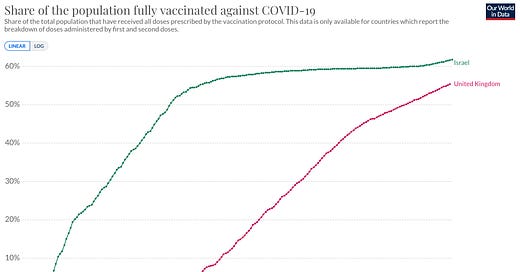Is Pfizer holding up against Delta?
The CDC is not tracking mild-moderate breakthrough cases, so in order to answer this we are dependent on tracking local numbers or data from other countries. On a local level, Pfizer seems to be holding up against severe disease. The problem is data coming out of Israel and the UK are drastically disagreeing:
Symptomatic disease: Evidence from Israel shows that Pfizer is only 39% effective at preventing systematic disease, while evidence in the UK shows 88%
Hospitalization: Evidence from Israel shows Pfizer prevents 81% hospitalizations (for >60 years old) and another study found the hospitalization rate of Delta was 85% higher than other variants. However, evidence in the UK shows 96% effectiveness against hospitalizations.
So, data from the UK is showing much stronger protection than data in Israel.
Which one is correct?
It’s possible that one has data collection issues or statistical mistakes. For example, the Israel study was very small, so we have less confidence in the numbers.
But these differences could also be “real” for a few reasons:
First, vaccine dosage policies differed. In an effort to provide some level of protection to more people faster, the UK implemented a delayed second dose policy. In other words, instead of 3 weeks between doses (like the clinical trials), they increased the time between doses to 12 weeks. Israel stuck to the 3 week regimen. Study after study show that the more time between COVID19 vaccine doses, the more antibody protection. We see this in non-COVID19 vaccines too. But, given the time pressure to save lives during a global pandemic, scientists in clinical trials chose the most minimal amount of time between doses.
Second, the populations vaccinated with Pfizer differed. In the UK, older populations are vaccinated with AstraZeneca, while younger populations are vaccinated with Pfizer. In Israel, everyone (including older populations) are vaccinated with Pfizer. Older adults and immunocompromised are more likely to have breakthrough cases. So, Israel would naturally have more breakthrough cases than the UK because Israel has more older people vaccinated with Pfizer.
Third, waning immunity. Researchers at the Israel Ministry of Health found that people who were vaccinated in January were having breakthrough infections at a greater rate than people vaccinated in April. This suggests that the protection is decreasing over time. Israel vaccinated their population a lot quicker than the UK. If protection was truly decreasing, it would make sense that Israel is showing decreased protection compared to the UK (at least for now).
I’m not entirely convinced of #1 and #3 though. The immune system is incredibly complex and even if antibodies are lower or decreasing, we expected this. Antibodies wane over time, and that’s okay because we have a “secondary antibody response”, like T-cells and memory B-cells, that kick in.
Why should we care?
Consistency in epidemiology is key. We need more studies in Israel and the UK to make sure these are “true” signals for Pfizer. But if there is a true difference between Israel and UK, then the United States needs to desperately figure out what camp we belong to. If efficacy is reduced, especially against severe disease, we will need to act fast, like administering a third dose and/or implementing stricter public health mitigation measures.
Love, YLE







Just a thought. I keep reading about extra, unused vaccines not being used. What if we started giving that surplus of vaccines as a booster? For example, I had my second vaccine in the middle of February, I am willing to go get another dose. Can't hurt. So why not. Seems like a good use instead of disposing of it as it expires.
I understand your point about antibodies waning but the immune system response still being effective; however, if Israel is seeing a real signal of more infections in individuals vaccinated earlier, that seems like it could suggest a waning immune response. I would be interested to know if the population vaccinated in Israel in January was the same as in April, or perhaps older people with weaker immune response in general were vaccinated first—seems like that would confound it). Regardless, even if #3 doesn’t hold up, #1 alone makes me think a booster could be beneficial.